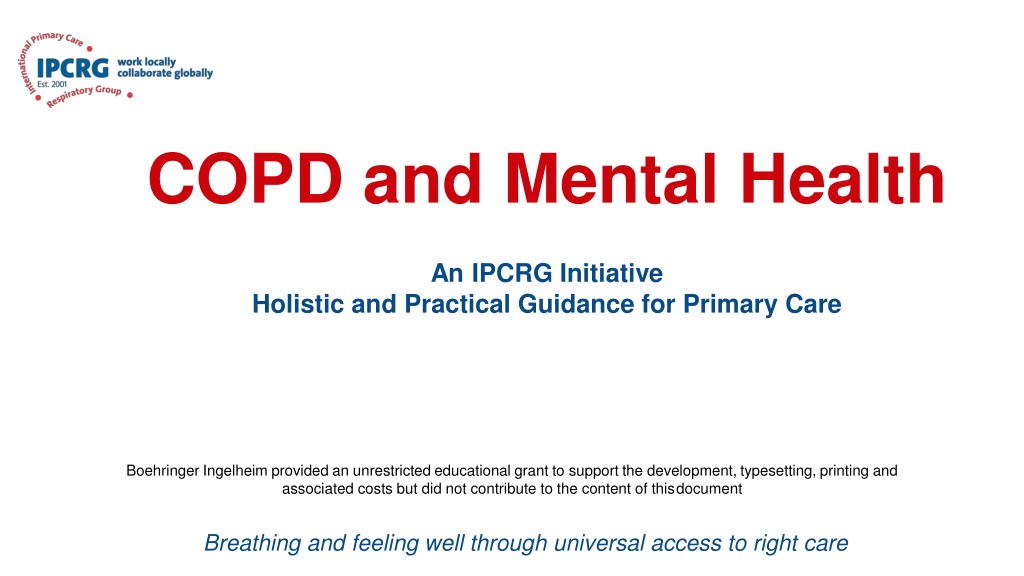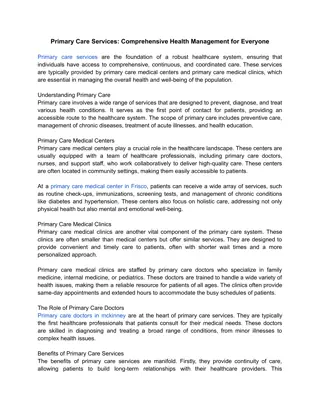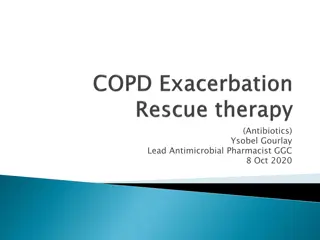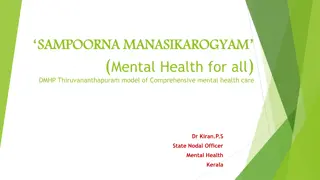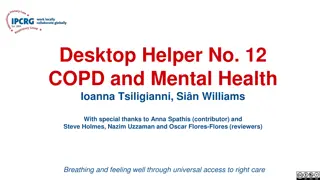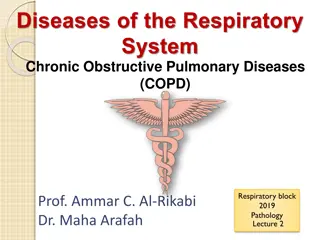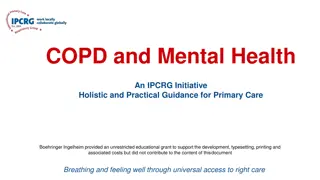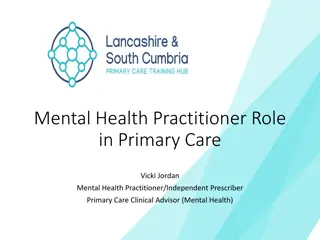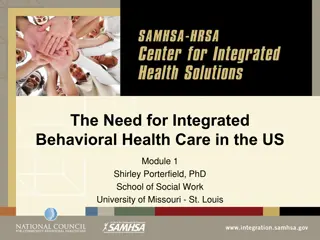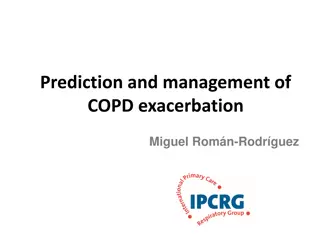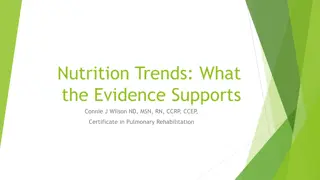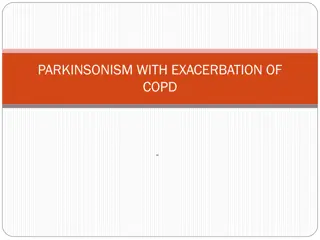Comprehensive Guidance on COPD and Mental Health in Primary Care
This document, supported by an educational grant, offers holistic guidance on managing chronic obstructive pulmonary disease (COPD) and mental health in primary care settings. It includes case studies, glossary of terms, and practical information for healthcare professionals to provide optimal care to patients. The content emphasizes the importance of understanding the intersection of COPD and mental health for better patient outcomes.
Download Presentation

Please find below an Image/Link to download the presentation.
The content on the website is provided AS IS for your information and personal use only. It may not be sold, licensed, or shared on other websites without obtaining consent from the author. Download presentation by click this link. If you encounter any issues during the download, it is possible that the publisher has removed the file from their server.
E N D
Presentation Transcript
COPD and Mental Health An IPCRG Initiative Holistic and Practical Guidance for Primary Care Boehringer Ingelheim provided an unrestricted educational grant to support the development, typesetting, printing and associated costs but did not contribute to the content of this document Breathing and feeling well through universal access to right care
COPD and Mental Health Case Studies COPD and Tobacco Dependence Izolde Bouloukaki (Greece) and Catalina Panaitescu (Romania) Breathing and feeling well through universal access to right care
About these slides Please feel free to use, update and share some or all of these slides in your non- commercial presentations to colleagues or patients There is a general introduction to COPD and mental health, followed by a case study The slides are provided under creative commons licence CC BY-NC-ND o BY stands for attribution (the obligation to credit the author and other parties designated for attribution) o NC stands for NonCommercial (commercial use is excluded from the license grant) ND means NoDerivatives (only verbatim copies of the work can be shared) When using our slides, please retain the source attribution: IPCRG 2022 COPD and Mental Health o Boehringer Ingelheim provided an unrestricted educational grant to support the development, typesetting, printing and associated costs but did not contribute to the content of this document.
Glossary of terms, abbreviations and acronyms ACE inhibitor, angiotensin-converting enzyme inhibitor GOLD, Global Initiative for Chronic Obstructive Lung Disease AIS, Athens Insomnia Scale BMI, body mass index CAT, COPD Assessment Tool COPD, chronic obstructive pulmonary disease FSS, Fatigue Severity Scale FEV1, forced expiratory volume in 1 second FVC, forced vital capacity GAD-7, General Anxiety Disorder 7 scale GP, general practitioner LABA, long-acting beta agonist mMRC, modified Medical Research Council Dyspnoea Scle PHQ-9, Patient Health Questionnaire 9 PSQI, Pittsburgh Sleep Quality Index SABA, short-acting beta agonist SC, smoking cessation TIA, transient ischaemic attack VBA, very brief advice Boehringer Ingelheim provided an unrestricted educational grant to support the development, typesetting, printing and associated costs but did not contribute to the content of this document.
Our aim To highlight the importance of smoking cessation in people with COPD and anxiety and provide an evidence- based intervention example through a clinical case Boehringer Ingelheim provided an unrestricted educational grant to support the development, typesetting, printing and associated costs but did not contribute to the content of this document.
What you will learn Understand the importance of evaluating smoking status in people with COPD and anxiety Identify the main barriers to smoking cessation in people with COPD and anxiety and appropriate methods to overcome them How to apply a structured smoking cessation intervention for people with COPD and anxiety Boehringer Ingelheim provided an unrestricted educational grant to support the development, typesetting, printing and associated costs but did not contribute to the content of this document.
The challenge of smoking cessation in people with COPD Smoking cessation is the most effective intervention in stopping the progression of COPD, as well as increasing survival and reducing mortality1 30 50% of people with symptomatic moderate to very severe COPD continue to smoke2 Smoking cessation may be more effective when counselling and pharmacological treatments are combined.3 However, even when a combined approach is taken, 65 85% are still smoking at 1 year2 People with COPD often have comorbidities which require special attention in the effort to quit smoking 1. Tonnesen P. Eur Respir Rev 2013;22:37-43; 2. Tashkin DP. Intern Emerg Med 2021;16:545-7; 3. GOLD 2022. Available at: https://goldcopd.org/2022-gold-reports-2/. Boehringer Ingelheim provided an unrestricted educational grant to support the development, typesetting, printing and associated costs but did not contribute to the content of this document.
Mental disorders: Important comorbidities in COPD Anxiety and depression are common in COPD and are associated with poorer health status, increased risk of exacerbations and emergency hospital admissions1 Multiple studies have demonstrated an association between cigarette smoking and increased anxiety symptoms or disorders2 Smoking, depression and anxiety are all associated with a higher risk of death in people with COPD3 1. GOLD 2022. Available at: https://goldcopd.org/2022-gold-reports-2/; 2. Moylan S, et al. Brain Behav 2013;3:302-26; 3. Lou P, et al. Respir Care 2014;59:54-61. Boehringer Ingelheim provided an unrestricted educational grant to support the development, typesetting, printing and associated costs but did not contribute to the content of this document.
Smoking cessation in people with COPD and mental disorders Mental health problems are negatively associated with successful smoking cessation1,2 Tobacco smokers with mental health problems tend to be:3,4 o More addicted to smoking o Smoke more cigarettes o More likely to relapse Require support for repeated quit attempts Contrary to population belief, quitting smoking reduces anxiety and depression and the effect size is as large, or larger, than antidepressants for mood and anxiety disorders1 o 1. IPCRG Desktop Helper, No 12. Available at: www.ipcrg.org/dth12; 2. Hashimoto R, et al. Respir Investig 2020;58:387-94; 3. Royal College of Physicians, Royal College of Psychiatrists, 2013; 4. Ho SY, et al. Gen Hosp Psychiatry 2015;37:399-407. Boehringer Ingelheim provided an unrestricted educational grant to support the development, typesetting, printing and associated costs but did not contribute to the content of this document.
Case study Breathing and feeling well through universal access to right care
Background I am always a bit tired and I feel like I use most of my energy just trying to breathe when I walk Mr JD is 67 years old and used to work as a taxi driver Her recently retired and spends most of his time at home, reading the newspaper and watching TV He drives his wife for the weekly shopping and occasionally participates in small household chores. But she is five years younger, likes to run the house and spoil him He had planned to fill his mornings by taking his 3 year old granddaughter to the park but has not been able to as he got very tired very quickly and was not able to keep up with her Boehringer Ingelheim provided an unrestricted educational grant to support the development, typesetting, printing and associated costs but did not contribute to the content of this document.
Medial history and risk factors Medical conditions: Hypertension Hypercholesterolaemia TIA COPD Recommended medication: ACE inhibitor+diuretic Antiplatelet drug Statin LABA and SABA as needed Allergies: none Risk assessment: Alcohol consumption: occasionally Smoking status: current smoker (37.5 pack year) BMI = 29.7 kg / m2 Exercise: limited, he feels constantly fatigued Vaccinations: up to date with influenza, pneumococcal and COVID-19 vaccinations Mr JD has shown good adherence to his recommended treatment for his cardiovascaular and cerebrovascular pathologies, especially after his TIA Although he also has been prescribed a long-term treatment for his COPD he rarely takes it as he feels he has too many medicines to take and his bronchitis only bothers him when he gets a cold His last episode of bronchitis was a year ago; he was prescribed a new treatment but didn t need to go to hospital Boehringer Ingelheim provided an unrestricted educational grant to support the development, typesetting, printing and associated costs but did not contribute to the content of this document.
Reason for visiting his GP Mr JD has come for a prescription renewal Boehringer Ingelheim provided an unrestricted educational grant to support the development, typesetting, printing and associated costs but did not contribute to the content of this document.
What should you do? Scenario 2? Assessment of: o Symptoms o Risk of future events Scenario 1? How do you feel? Clinical exam and general recommendations You know that smoking is bad for you don t you? Prescription renewal Comorbidities Clinical examination VBA for Smoking Cessation Prescription renewal o Boehringer Ingelheim provided an unrestricted educational grant to support the development, typesetting, printing and associated costs but did not contribute to the content of this document.
Assessment of symptoms Modified Medical Research Council (mMRC) dyspnoea scale: Grade Description of breathlesness 0 I only get breathless with strenuous exercise 1 I get short of breath when hurrying on level ground or walking up a slight hill 2 On level ground, I walk slower than people of the same age because of breathlessness, or have to stop for breath when walking at my own pace I stop for breath after walking about 100 yards or after a few minutes on level ground 3 4 I am too breathless to leave the house or I am breathless when dressing Boehringer Ingelheim provided an unrestricted educational grant to support the development, typesetting, printing and associated costs but did not contribute to the content of this document.
Impact on quality of life X X X X X X X X 20 Boehringer Ingelheim provided an unrestricted educational grant to support the development, typesetting, printing and associated costs but did not contribute to the content of this document.
Combined COPD assessment 1. GOLD 2022. Available at: https://goldcopd.org/2022-gold-reports-2/. Boehringer Ingelheim provided an unrestricted educational grant to support the development, typesetting, printing and associated costs but did not contribute to the content of this document.
Risk of future events Incidence of exacerbation is high in COPD patients1 Smoking is a major factor in COPD exacerbations2 There is a high prevalence of COPD exacerbations requiring admission to a hospital unit in those patients who continue to smoke2 Previous admission for exacerbation is a strong predictor and can identify patients at risk1 The review of the existing literature for COPD patients showed the following: The evidence is strong (GRADE level A) to suggest that smoking cessation is a key intervention for smokers with COPD and should constitute a core element of long-term management of these patients3 1. GOLD 2022 Report, pg. 31, https://goldcopd.org/2022-gold-reports-2/ 2. Badaran E, et al. Eur Respir J 2012;40:1055; 3. Tobacco Cessation Guidelines for High Risk Groups. Available at: https://ensp.network/tob-g/. Boehringer Ingelheim provided an unrestricted educational grant to support the development, typesetting, printing and associated costs but did not contribute to the content of this document.
Supporting smoking cessation Healthcare professional Patient response ASK tobacco use at every clinical contact - I can see from your records that you have used tobacco recently. Is that still the case? Yes, I smoke 15 cigarettes per day for about 40 years, without any previous attempts at smoking cessation ADVISE about effective ways to quit (and if necessary, about the harms of tobacco) - Do you know the best way of stopping using tobacco or reducing its harm? Not really, I have never thought of that till now you are asking ACT according to the patient s response - Would you like to talk about the options available to help with your tobacco use today? Yes, that would be helpful Record your interaction in the patient s notes Boehringer Ingelheim provided an unrestricted educational grant to support the development, typesetting, printing and associated costs but did not contribute to the content of this document.
Comorbidities: Assessment of mental health problems in people with COPD Available at: https://www.ipcrg.org/dth12. Boehringer Ingelheim provided an unrestricted educational grant to support the development, typesetting, printing and associated costs but did not contribute to the content of this document.
Comorbidities: Assessment of mental health for Mr JD Regular consultation Specific assessment 6 PHQ-9 0-4: normal/minimal depression 5-9: mild depression 10-14: moderate depression 15-19: moderately severe depression 10 GAD-7 0-4: normal/minimal anxiety 5-9: mild anxiety 10-14: moderate anxiety 15-19: moderately severe anxiety 6 40 FSS* Score 36 indicates fatigue 7 AIS** 0-5: absence of insomnia 6-9: mild insomnia 10-15: moderate insomnia 16-25: severe insomnia 6 PSQI# Score 5 is indicative of poor sleep quality *Individuals rate their agreement with nine statements concerning the severity, frequency and impact of fatigue on daily life. ** A 8-item self-assessment psychometric instrument, which has been used as a tool to evaluate the severity of insomnia. # A 7 component instrument used to measure the quality and patterns of sleep in adults over the last month. Boehringer Ingelheim provided an unrestricted educational grant to support the development, typesetting, printing and associated costs but did not contribute to the content of this document.
Barriers to the assessment of mental health problems for people with COPD Patient-perceived barriers o Lack of knowledge System-level barriers o Poor communication between primary care and mental health systems Reluctance to disclose symptoms of anxiety or depression Physician-perceived barriers o Lack of a standardised diagnostic approach for anxiety and depression o o Lack of adequate resources for mental health treatment In order to address these barriers, an integrated treatment approach is required from healthcare professionals, patients and caregivers o o Short-consultation time Lack of confidence to pursue in-depth psychological assessment Natali D, et al. Breathe 2020;16:190315. Boehringer Ingelheim provided an unrestricted educational grant to support the development, typesetting, printing and associated costs but did not contribute to the content of this document.
Thinking about Mr JD Challenges He has 3 comorbid conditions in addition to his COPD He takes 4 medications every day plus his reliever as needed (he does not like to take too many medicines) Positives He is up to date with his vaccinations He has a good relationship with his doctor Low adherence to the COPD treatment He adheres well to his other medication regimen He really wants to try to stop smoking He has a GAD with no previous formal diagnosis or appropriate management Boehringer Ingelheim provided an unrestricted educational grant to support the development, typesetting, printing and associated costs but did not contribute to the content of this document.
Next steps: Motivational interviewing Aim Conversation Clarify that you are not judgmental about tobacco use We know how hard this is and that this is an addiction and that nicotine is more addictive than heroin Encourage the person to imagine and communicate what they think might be the benefits of quitting Did you know you that after quitting smoking will get fewer bronchitis episodes? Did you know that you will likely feel much calmer and more positive, and have a better quality of life, after giving up smoking? You may also find that you will be able to fall asleep more easily, and sleep for longer once in bed Consider positive reinforcement (pleasure) to motivate the patient to quit smoking Did you know that if you quit smoking your energy levels will increase and you will be able to be around for grandchildren growing up? Boehringer Ingelheim provided an unrestricted educational grant to support the development, typesetting, printing and associated costs but did not contribute to the content of this document.
Management plan for Mr JD Provide counselling (empathic understanding and respect): ASK / ADVISE / ACT Discuss pharmacological treatment Nicotine replacement therapy Discuss abstinence and suggest coping strategies Encourage social support Assist in dealing with barriers such as fear of failure, dealing with stress, weight gain and social pressures to smoke Provide advice on nutrition, physical activity and sleep hygiene Provide advice on managing withdrawal symptoms and reassurance that they are short-lived Varenicline Bupropion Assist with developing a quit plan including setting a quit date Schedule a next review date Use email, text or phone as options for follow-up sessions Boehringer Ingelheim provided an unrestricted educational grant to support the development, typesetting, printing and associated costs but did not contribute to the content of this document.
Smoking cessation for people with mental health disorders1 3 Adding medications/management strategies for mood disorders to a standard program of smoking cessation may achieve better long-term quit rates For Mr JD, consider initiating treatment for his GAD 1. van der Meer RM, et al. Cochrane Database Syst Rev 2013;8:CD006102; 2. Anthenelli RM, et al. Ann Intern Med 2013;159:390e400; 3. Anthenelli RM, et al. Lancet 2016;387:2507e20. Boehringer Ingelheim provided an unrestricted educational grant to support the development, typesetting, printing and associated costs but did not contribute to the content of this document.
Summary Many people with COPD continue to smoke despite evidence that smoking cessation is the most effective intervention in increasing survival and reducing morbidity Smoking cessation reduces anxiety and depression People with COPD and mental health disorders who smoke often need support for multiple quit attempts Combine counselling and pharmacological treatments as this is the most effective intervention Tobacco smokers with mental health disorders tend to be more addicted to smoking, smoke more cigarettes and are more likely to relapse Anxiety and depression are common in people with COPD and should be actively evaluated and treated Boehringer Ingelheim provided an unrestricted educational grant to support the development, typesetting, printing and associated costs but did not contribute to the content of this document.
